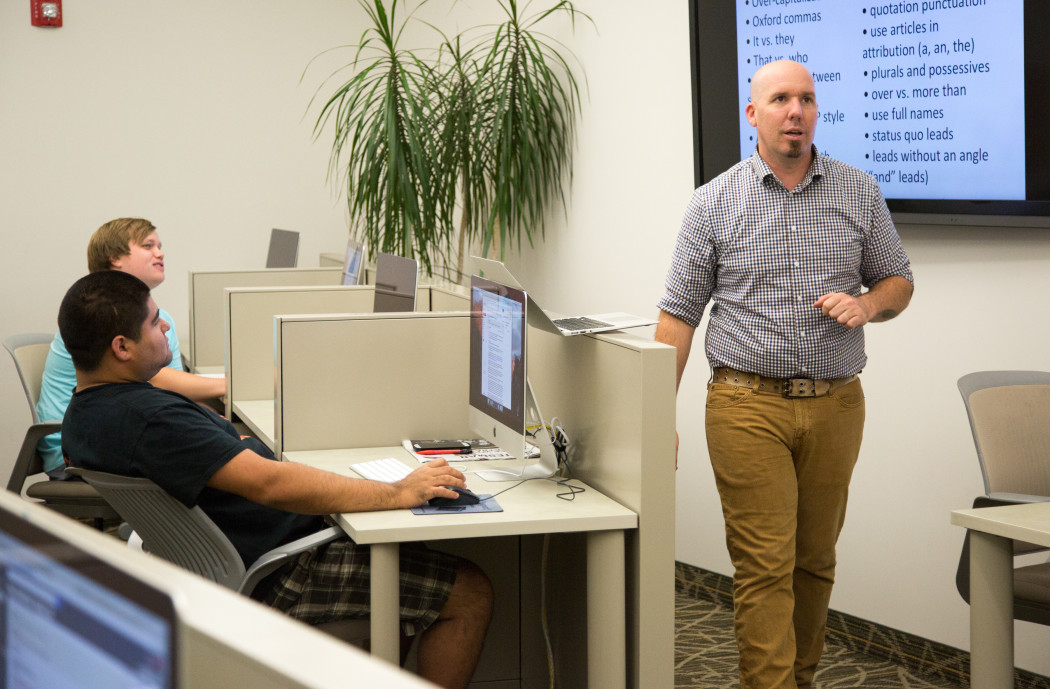USU Professor Matthew Laplante speaks on the first amendment and banned books
Exercising your first amendment today might be as simple as posting about the presidential debate on social media, respectfully speaking your mind in church when controversy arises or reading a banned book.
Utah State University assistant professor of journalism Matthew D. LaPlante gave a talk at the Logan Library Tuesday night and stressed the following: “Words these days matter a lot, and sometimes more than actions.”
LaPlante used powerful examples from everyday life, spreading from the outrage at Colin Kaepernick’s recent display of protest to the way teachers in Salt Lake were reminded to lead the Pledge of Allegiance every morning to a bunch of children who are “young enough to believe in Santa Claus.”
LaPlante asked if Americans can really expect a country of 8 million atheists and 13 million agnostics to pledge themselves to “one nation, under God?” Similarly, can we ask those who have felt discriminated against or oppressed to utter the words “with liberty and justice for all?” LaPlante said he did not mean to insinuate it was wrong to say the Pledge of Allegiance. He merely wished to advocate for every man and woman’s right not t
“Our fear of repercussions is greater than our desire to want to share,” he said, “and our disdain for being offended is greater than our desire to listen.”
LaPlante begged his listeners to answer for themselves this question: “what am I not saying because I am afraid of the repercussions I will face within my school, church, or familial circles?”
Alix Zelener, a junior studying journalism at USU pointed out, “The discussion is handicapping itself because we can’t express ourselves. How do you fix a society that is constantly growing more and more incapable of good argument?”
Katie Myler, a freshman English major agreed.
“I didn’t even consider it before, but I’m doing this,” she said. “Without realizing it, I censor what I say because I’m afraid… And who doesn’t, really? But this is important. We need to try.”
If we have an unspoken rule of refraining from confronting disagreement, then we have a real threat to our society, LaPlante then argued. This doesn’t mean we have to live in a hellhole of discontentment and tension. There is a way to voice as well as hear other opinions respectfully.
“For one thing, subjecting your opinion to your curiosity is difficult, but very effective,” he said. “Ask someone to explain what they mean, rather than hammering in your point. Because at best, that come across obnoxious and at worst, it’s like trolling”.
Anonymity and social media make getting in a heated argument look enticing because it’s done behind a screen. Real, good argument is face-to-face and humble enough to accept differences. Real discussion promotes discovery, not disdain.
Lauri Yancey, a Cache Valley resident added, “You’re advocating for telling your point-of-view at all times, and I agree. And again I’m advocating for doing so tactfully… Because we do need to understand each other, even when we don’t agree with each other.”
The question remains. What would happen to a teacher in Salt Lake if they didn’t ask their students to recite the pledge? Mostly likely, courts would prevent them from facing serious consequences like fines or jail time. But would they face social ridicule? Absolutely.
Freedom of speech isn’t free. LaPlante’s hope is that society can change and become more tolerant of expression.
@viviangates29

